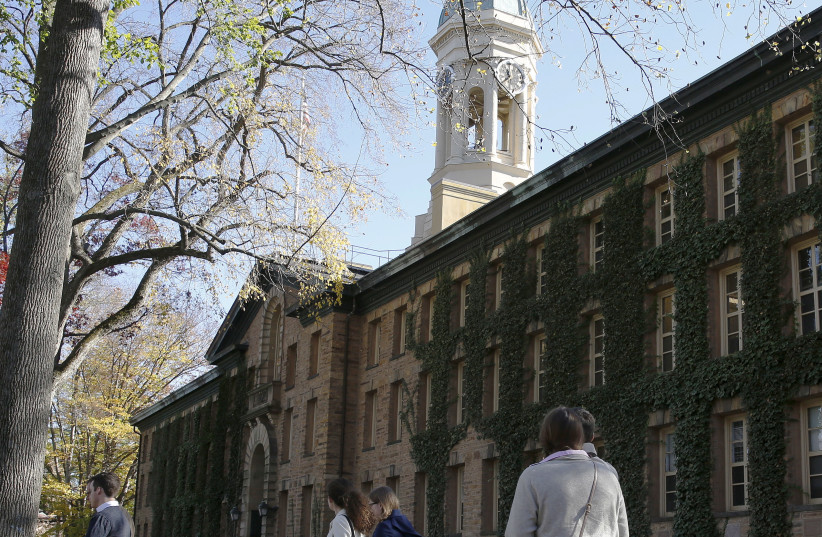Middle East scholar Xiyue Wang sued Princeton University for failing to ensure his security in Iran and allegedly running a campaign to prevent media coverage about the regime’s illegal imprisonment of the academic.
The Washington Free Beacon first reported Thursday on the lawsuit, citing sections from the legal document: “Everything Princeton did and abstained from doing was centered around absolving its institutional responsibility, protecting its institutional reputation, and maintaining its political relations with Iran.”
Wang arrived in Iran in early 2016 to work on his dissertation, and the authorities arrested him that summer.
The US government secured Wang’s release in December 2019 as part of a prisoner exchange. Wang argued that Princeton and its Iran Center took the advice of “pro-regime activists and academics” prior to his arrest and after his imprisonment.
The Free Beacon titled its article “Historian Says Princeton Left Him To ‘Rot’ in Iranian Prison” and reported that Wang said Princeton ignored his security concerns. According to a July 24, 2016, email, John Haldon, the former director of Princeton’s Iran Center, told Wang to “sit tight and say nothing to anyone outside the small group of people who already know about the situation.”

The lawsuit said, “Prof. Haldon and Princeton were clearly trying to prevent Mr. Wang’s situation from being known beyond the University.”
Two Princeton lawyers and Anastasia Vrachnos, the vice provost, told Wang’s wife, Hua Qu, according to the Free Beacon, that Wang should not seek to go to the Swiss Embassy that represents US interests in Iran. The Swiss Embassy could have afforded Wang diplomatic protection. The lawsuit says that Seyed Hossein Mousavian, a Princeton academic and former Iranian regime ambassador to Germany, as well as other Princeton employees who have contacts to Iran’s regime “made the intentional decision not to utilize their political capital” in Iran to help him.
The lawsuit says, “Instead of taking action to assist and accelerate Mr. Wang’s release, Princeton chose instead to protect their own reputation over Mr. Wang’s health and well-being. Princeton did nothing but try to suppress news about the case.”
The Jerusalem Post sent a press query to Princeton University on Saturday.
The Iranian-American human rights activist Lawdan Bazargan, who was illegally imprisoned in Evin prison in Tehran in the 1980s as a political dissident, the same penitentiary where Wang was held, told the Post, “Despite the far-right, xenophobic, racist, and sexist nature of the Islamic regime of Iran, the liberal progressive Left in the West, especially in the United States, has welcomed them in the academia because of IRI’s empty anti-imperialist slogans. While the Nazi ideology has been discredited, many leading universities in the United States hire proxies of the Islamic Regime, people such as Mousavian at Princeton and Mohammad Jafar Mahallati at Oberlin College, and allow them to brainwash the students with their backward ideas.”
According to Mahallati’s Oberlin College webpage, he taught at Princeton University as an adjunct professor. In 2018, Amnesty International accused Mahallati of covering up “crimes against humanity” of at least 5,000 Iranian political prisoners during the 1988 massacre in Iranian prisons.
Mahallati carried out the cover-up while serving as the Islamic Republic’s ambassador to the UN. Mahallati previously told the Post that he was not involved in the mass murder. Mousavian was the Iranian regime’s ambassador to Germany in 1992 when the Islamic Republic, according to a Berlin court, assassinated four Iranian Kurdish dissidents in a Berlin restaurant.
Bazargan said, “These so-called professors not only are dangerous ideologically, but they also have the blood of Iranians on their hands. Cozying up to the former diplomats of the Islamic Regime of Iran in the past 40 years not only has helped the Islamic Regime to oppress its people and further its reach in the region through its proxies such as Hezbollah, Hamas and Houthis but it also has put the US’s national security in danger.” Bazargan has urged Oberlin College to fire Mahallati.
Wang currently works Wang for Rep. Jim Banks (R-Indiana) as a national security advisor.
